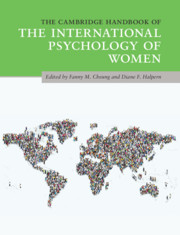Book contents
- The Cambridge Handbook of the International Psychology of Women
- The Cambridge Handbook of the International Psychology of Women
- Copyright page
- Dedication
- Contents
- Figures
- Tables
- Contributors
- Acknowledgments
- Section 1 The Underpinnings of Sex and Gender and How to Study Them
- Section 2 Developmental Perspectives of the International Psychology of Women
- Section 3 Cognitive and Social Factors
- 10 Sex, Gender, and Intelligence
- 11 At the Crossroads of Women’s Experience
- 12 Gender and Personality Research in Psychology
- 13 Selfhood and Self-Construal
- 14 Cultural Influences on Body Image and Body Esteem
- 15 The Not So Subtle and Status Quo Maintaining Nature of Everyday Sexism
- 16 A Gendered Light on Empathy, Prosocial Behavior, and Forgiveness
- 17 The Impact of Gender and Culture in Consumer Behavior
- 18 Evolutionary Roots of Women’s Aggression
- Section 4 Work and Family Issues
- Section 5 Inequality and Social Justice
- Section 6 Health and Well-Being
- Epilogue Some Final Thoughts and Take-Home Messages
- Index
- References
14 - Cultural Influences on Body Image and Body Esteem
from Section 3 - Cognitive and Social Factors
Published online by Cambridge University Press: 20 July 2020
- The Cambridge Handbook of the International Psychology of Women
- The Cambridge Handbook of the International Psychology of Women
- Copyright page
- Dedication
- Contents
- Figures
- Tables
- Contributors
- Acknowledgments
- Section 1 The Underpinnings of Sex and Gender and How to Study Them
- Section 2 Developmental Perspectives of the International Psychology of Women
- Section 3 Cognitive and Social Factors
- 10 Sex, Gender, and Intelligence
- 11 At the Crossroads of Women’s Experience
- 12 Gender and Personality Research in Psychology
- 13 Selfhood and Self-Construal
- 14 Cultural Influences on Body Image and Body Esteem
- 15 The Not So Subtle and Status Quo Maintaining Nature of Everyday Sexism
- 16 A Gendered Light on Empathy, Prosocial Behavior, and Forgiveness
- 17 The Impact of Gender and Culture in Consumer Behavior
- 18 Evolutionary Roots of Women’s Aggression
- Section 4 Work and Family Issues
- Section 5 Inequality and Social Justice
- Section 6 Health and Well-Being
- Epilogue Some Final Thoughts and Take-Home Messages
- Index
- References
Summary
The influence of ethnicity and culture in body image etiology has only recently been considered. Previous accounts asserting that White women are at increased risk for body dissatisfaction and body-related pathology relative to women of color are being contested after multiple body image investigations using culturally diverse samples report similar or higher risk levels in women of color. Such findings highlight the need to reevaluate the ability of current developmental frameworks, diagnostic criteria, and psychometric tools in capturing body image experiences of ethnically diverse women. Most body image inventories were developed on White women from Westernized cultures, emphasizing weight phobia and Westernized appearance ideals. Such inventories often fail to detect body image concerns in women of color. Broadening the understanding of body image etiology to include the experiences of ethnically diverse women is crucial for accurate identification and effective treatment of body-related pathology and comorbid conditions in women of color.
Keywords
- Type
- Chapter
- Information
- The Cambridge Handbook of the International Psychology of Women , pp. 190 - 204Publisher: Cambridge University PressPrint publication year: 2020
References
Suggested Readings

Elysia G. Sotiriou is in her final year of the Counseling Psychology doctoral program in the Department of Educational Psychology at the University of Texas at Austin. Her research involves exploring the impact of culture on body image development and eating disorder risk, designing culturally inclusive measures to capture the body-related concerns of ethnic minority women, and expanding efficacious body image interventions to benefit under-served populations. Throughout her academic and clinical practicum opportunities, Elysia has cultivated a multitude of unique experiences working clinically with culturally diverse children, adolescents, and young adult women struggling with a range of body-related concerns. Elysia is currently a fellowship scholar in the Austin & Dell Medical School’s Integrated Behavioral Health (UT) program, a comprehensive, multidisciplinary training initiative designed to prepare culturally and linguistically diverse trainees to pursue careers treating under-served populations in integrated healthcare settings. Sotiriou was born and raised in Salt Lake City, Utah. She received her BA in psychology, sociology, and French from University of Wisconsin, Madison. Her graduate degrees are from the University of Texas, Austin. Upon graduating from UW-Madison, she accepted a job in Greece and moved to Athens just before the second austerity bill and the first wave of violent protests began. She studied in Paris, at La Sorbonne, for a year in 2010.

Germine H. Awad is an Associate Professor in the Human Development, Culture, and Learning Sciences and Counseling Psychology programs in the Department of Educational Psychology at the University of Texas at Austin. Her scholarship is characterized by three interrelated areas of inquiry: prejudice and discrimination, identity and acculturation, and body image among women of color. She has also written in the area of multicultural research methodology. The majority of her research is guided by the questions “What factors lead to discrimination against ethnic minorities?” and “What impacts perceptions of experienced discrimination?” The two populations that she has primarily focused on are Arab/Middle Eastern Americans and African Americans. Awad is concerned with how prejudicial attitudes and ideology impact attitudes toward ethnic minorities generally and within specific domains such as the workplace and higher education. In addition, she examines how racial/ethnic identity and acculturation impact ethnic minorities’ perception of discrimination, their experience of their bodies, and development of body image concerns.

